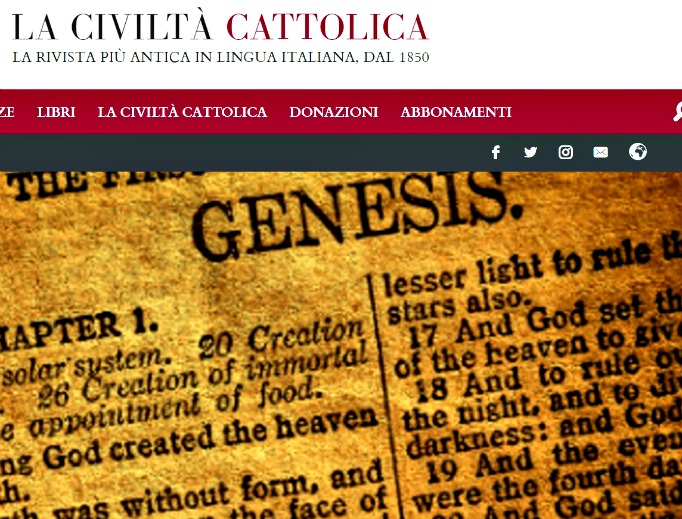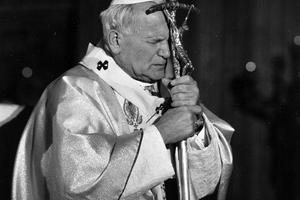Vatican Journal Jousts Against Imaginary ‘Ecumenism of Hate’ in America
COMMENTARY: The essay’s rhetoric of ‘inclusion’ and accusations of ‘fundamentalism’ immediately taint it with an aggressive cultural progressivism.

I was surprised by a recent piece of extended commentary in La Civiltà Cattolica, the Jesuit newspaper that functions as a quasi-official mouthpiece for the Vatican.
Written by the editor in chief, Jesuit Father Antonio Spadaro, and Argentinean edition editor Rev. Marcelo Figueroa, “Evangelical Fundamentalism and Catholic Integralism in the USA: A Surprising Ecumenism” is a collection of uninformed assertions spiced with malice. It argues that Protestant and Catholic support for American conservatism amounts to an “ecumenism of hate.”
It’s hard to take this seriously. Father Spadaro and Figueroa seem to know very little about the history of religion and politics in the United States. For instance, they say “religion has had a more incisive role in the electoral process and government decisions over recent decades, especially in some U.S. governments.” This is wrong. The great reform movements in our history — abolition, prohibition and civil rights — have been motivated and articulated in explicitly Christian terms. Princes of the Church, such as Cardinals Mundelein and Spellman, were frequent guests at Franklin Roosevelt’s White House.
If anything, religion exercises less political influence today than in the past. For 100 years, every mayoral candidate in Boston had to kiss the cardinal’s ring if he hoped to be elected. Today, Cardinal Sean O’Malley is largely irrelevant to Boston city politics.
Father Spadaro and Figueroa also seem to know very little about American Protestantism. They insinuate that all conservative Protestants are fundamentalists. They claim that Calvinist philosopher R.J. Rushdoony (1916-2001) exercises wide influence. In fact, he was an interesting but obscure figure who gained no significant following.
They demonstrate their ignorance of his work by implying that he encouraged an “apocalyptic geopolitics,” when, in fact, his form of Biblicism was post-millennial, a view of end times associated with gradual reform rather than conflict and cataclysm.
They insist upon the significance of Norman Vincent Peale, an anodyne and mostly forgotten figure from the mid-20th century who repackaged therapeutic self-affirmation in vague Christian terms.
About Catholicism in America, Father Spadaro and Figueroa have less to say, but they zero in on “Catholic Integralists,” who they suggest are taking orders from “Church Militant” (an obscure website).
These Catholics, we are told, join forces with “evangelical fundamentalists” in order to gain “religious influence in the political sphere.” They use “fear” to motivate “value voters” and advocate a “spiritual war.” All of this serves “the nostalgic dream of a theocratic type of state.”
This analysis is so slapdash that I find myself scratching my head. In some places the contradictions are patent. Father Spadaro and Figueroa condemn George W. Bush for promoting “political Manicheanism.” Meanwhile, the entire commentary is laced with dualistic caricatures — the “ecumenism of hate” versus Pope Francis’ ecumenism of “inclusion, peace, encounter and bridges.”
The authors say that “religions cannot consider some people as sworn enemies and others as eternal friends.” Yet Steve Bannon is denounced by name, as are Bush and Donald Trump.
The contradictions can be quite damning. Father Spadaro and Figueroa tell us that “the religious element should never be confused with the political one.” An important warning, to be sure, but the entire purpose of the article is to use their roles as close associates of Pope Francis to lend religious credence and authority to what is transparently an attack on American conservatism and its influence, not just in the United States, but globally. And there’s a sad predictability to singling out Bannon, Bush and Trump. That trio is almost always part of today’s progressive litany of “Evil Ones.”
The contradictions in “Evangelical Fundamentalism and Catholic Integralism” reflect the Francis papacy fairly accurately. The Holy Father tends to meet his critics with Manichean caricatures.
Those who worry about the doctrinal coherence of allowing divorced-and-remarried people to receive Communion are addressed as Pharisees. Those who advocate prudent limits on immigration are ideologues of “exclusion.”
As Father Spadaro and Figueroa report, “Francis wants to break the organic link between culture, politics, institution and Church.” That’s all well and good, but in the contemporary political culture of the West, the rhetoric of “inclusion” and accusations of “fundamentalism” that come in shotgun blasts immediately ally one with an aggressive cultural progressivism that uses political power to achieve its ends.
It’s an illusion to imagine that this papacy is detaching the Catholic faith from partisan politics when its semi-official spokesmen harrumph that the true faith does not “build barrier-fences crowned with barbed wire.” Such language is not a sober statement of principle. It is a partisan intervention into the debate about immigration that is roiling politics throughout the West.
In addition to contradictions and self-deceptions, “Evangelical Fundamentalism and Catholic Integralism” manifests an unfortunate authoritarianism. Father Spadaro and Figueroa create an atmosphere of condemnation, and they do so while insulating themselves from any responsibility for the truth of the matters they discuss.
For example, I’m not sure if Father Spadaro and Figueroa are attacking First Things, the magazine I edit. Our founder, Father Richard John Neuhaus, believed that we should be light and salt in society, speaking in the public square with an unashamedly religious voice. One of our goals is to renew the moral and religious consensus in the United States, which we believe is necessary for a healthy society capable of democratic self-government and resistant to consumer culture. In that sense, we certainly seek more “religious influence in the political sphere.”
Does that make First Things an organ of the wicked “Catholic Integralists,” those who “profess themselves in ways that until recently were unknown in their tradition and using tones much closer to evangelicals”?
As a Catholic, am I supposed to repent and bring myself and First Things into conformity with Pope Francis’ teaching on the role of religion in public life? Does the initiative Evangelicals and Catholics Together promote an “ecumenism of hate”? Should it be disbanded?
The atmosphere of condemnation raises these questions. But nothing clear is stated. In fact, I suspect the careless approach Father Spadaro and Figueroa take is deliberate. The dog’s breakfast of assertions sets a tone, but does so without the inconvenience of articulating a position that must be defended.
As a consequence, other agents and emissaries can attack First Things as anti-Catholic, while at the same time insulating this papacy from responsibility for defining and applying fundamental principles that can be analyzed, assessed and criticized in light of the larger tradition of Catholic social doctrine.
I’ve never been tempted by ultramontanism, the exaggerated emphasis on papal pronouncements in Catholic life, and so I have no spiritual difficulty dismissing the particular charges leveled in “Evangelical Fundamentalism and Catholic Integralism.” But the larger implication of this effusion from two intimates of Pope Francis dismays me.
Like the article, the Francis papacy runs on exaggerated rhetoric rather than clear and informed analysis. Instead of relying on the disciplined language of tradition, Pope Francis, too, often bandies about the clichés of our time. This cannot help but make him sound like a partisan in today’s culture clashes.
And Father Spadaro and Figueroa clarify the way in which this papacy traffics in a method of authoritarian manipulation that will be, over time, widely demoralizing, because it casts judgments without clarity and implies punishments without accountability.
What precisely is Pope Francis’ teaching on the role of religion in public life? Does the turn to a more “pastoral” approach mean bishops should now refrain from teaching about sexual morality? Is it now wrong to pronounce the marital bond indissoluble, or to regard certain acts as intrinsically disordered? Is one even permitted to ask the Pope these and other questions?
I’m sorry to draw these unhappy conclusions, but one must face reality. Exaggerated but diffuse denunciations create an atmosphere of intimidation that refuses to take magisterial responsibility. We’re in for a rough ride.
R.R. Reno is the editor of First Things magazine.

















